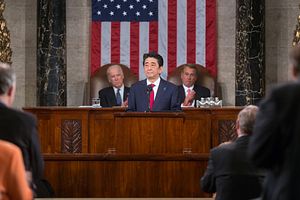Japanese Prime Minister Shinzo Abe concluded his U.S. visit and returned to Japan on May 6. During his stay, he visited four cities — Boston, Washington D.C., Los Angeles and San Francisco. At each stop, he had at least one major event that was uniquely tailored for the city he visited (i.e., a speech at Harvard University in Boston, a conversation with Mark Zuckerberg in San Francisco, etc).
Abe’s visit to Washington D.C. — central in his itinerary — was as luminous as any state visit by a foreign leader could get. Blessed with beautiful spring weather, his schedule was packed with events, including a summit with President Barack Obama, a luncheon hosted jointly by Vice President Joseph Biden and Secretary of State John Kerry, a state dinner hosted by President Obama, and an address to a joint meeting of Congress (the first time ever for a Japanese prime minister).
The U.S.-Japan Joint Vision Statement issued following the summit is full of future-oriented action items on which the two countries can cooperate not only on a bilateral basis but also for the peace and prosperity in the Asia-Pacific and beyond. The document clearly lays out the vision for the international order and supporting norms and principles that the two countries share: reaffirmation of the alliance, strengthening regional and international institutions, cooperation in major policy issues and boosting grass-roots exchanges.
Abe’s arrival in Washington D.C. was preceded by a landmark defense cooperation agreement between the United States and Japan. The newly revised Guidelines for U.S.-Japan Defense Cooperation, released on April 27 at the conclusion of foreign and defense ministers’ meeting (known as a “two-plus-two”) in New York, was hailed as transformative. The document lays out the principles for bilateral defense cooperation that allow U.S. military and Japan Self-Defense Forces to work together more deeply in greater variety of operations.
But one week after Abe’s visit to Washington, all we hear about now is criticism of Abe’s speech before the U.S. Congress.
There are many who argue that the criticism against Abe’s speech is justified. After all, a speech at a joint session of Congress is a special occasion. Although the primary audience is U.S. members of Congress that are present and Americans who watch the speech through broadcasts, it does have a global audience, and Abe knew that. One can make a case that Abe, if he were aware of the global nature of his audience, could have used this opportunity to springboard his reconciliation efforts with Japan’s neighbors by making a more explicit reference to his predecessors’ past statements on Japan’s World War II-era misconduct. His failure to do so, one could argue, cost him a historic opportunity.
Still, the point can be made that, in the context of the U.S.-Japan bilateral relations, Abe’s speech was appropriate. It was also generally received well. Not only was his speech interrupted by applause and standing ovations many times, many members of Congress lingered after the speech to shake Abe’s hand to congratulate him. Some even asked Abe to autograph the copies of his speech that were distributed to them beforehand. Based on the reaction he received on the floor of Congress, it is hard not to think of his speech as a success.
Furthermore, Abe did make an effort to address historical issues during his visit to the United States. In his joint press conference with Obama following their summit on April 28, Abe stated that his government would not revise the 1993 Kono statement regarding comfort women. In his speech on April 29, he referred to “remorse” about Japan’s behavior in Asia, and again reiterating his position that he would uphold all of his predecessors’ past statements on Japan’s war guilt. In other words, Abe said what needed to be said. The only problem was he did so in his own way, not in the way that his critics wanted him to.
Continuing to criticize Abe for his congressional speech is futile, even counterproductive. The United States and Japan completed a summit that was highly productive, and also made great progress in the alliance relationship. Brushing aside these outcomes and zeroing in on what Abe should have said in his congressional speech is simply unfair and unbalanced. Would the audience have rather heard Abe spend most of his speech apologizing for Japan’s past wrongdoings and offer very little on his vision for Japan’s future, and the future of U.S.-Japan alliance? I would think not.
Now is not the time to nitpick and parse his speech text to death. Rather, Abe should be congratulated for his successful U.S. visit and a job well done. Of course, he can be encouraged to consider stepping out further as he crafts his statement on August 15 at the commemoration of the 70th anniversary of the end of World War II. But he needs to receive credit for his achievements first.
To date, Japan’s “history issue” has repeated a seemingly endless cycle, a negative spiral where the government’s apologies keep being nullified by provocative statements by high-profile revisionists. Only Abe, whom these revisionists consider as a credible political leader, can put an end to this cycle. But endless criticism against Abe will make it more difficult for Abe to maneuver, providing him less incentive to make further efforts.
On April 25, Obama talked about having “something that rhymes with bucket list” during the White House Correspondents’ dinner. By criticizing Abe non-stop for what he should have said and done for the history issue without acknowledging what he said and did right, we run the risk of Abe putting the history issue onto his own “rhymes with bucket list.” That will not be a good outcome for anybody, particularly for the United States.

































